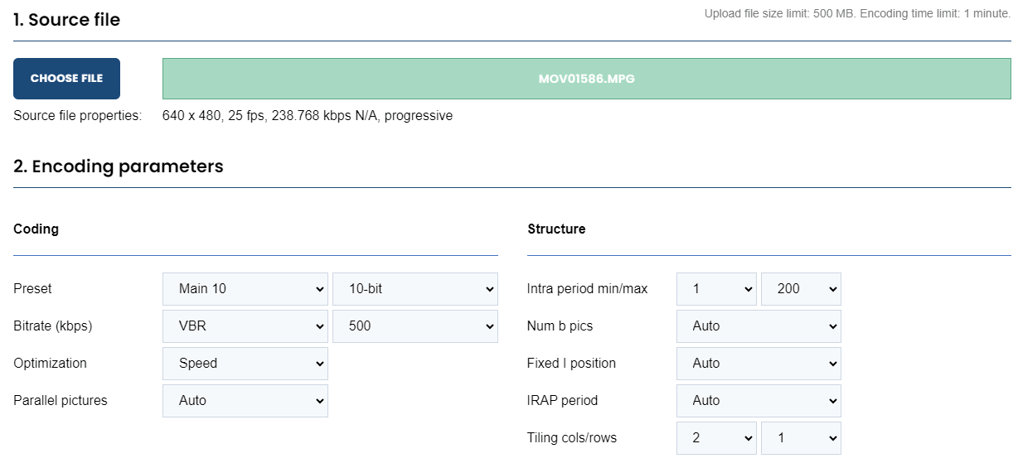
SDK Evaluation the Easy Way
Software Development Kits (SDK) are a rather abstract technology which makes evaluating and testing them a challenge at times. Less technical people might run into difficulties that prevent them from coming to a satisfactory conclusion. This is even more eminent when evaluating audio and video codecs, like the MainConcept SDKs or FFmpeg Plugins. Targeting typical benchmarking like performance, quality and standard compliance testing becomes even more complex. To ease the burden of evaluating such codecs, we developed a preset-based online tool that gives users concrete examples and quick results for their decision making, the MainConcept Content Creation Lab. The good thing is that without a dedicated login everyone can use. So let’s look at how it works.
What is the Content Creation Lab?
The MainConcept Content Creation Lab is a simple yet powerful online tool for testing various encoding formats using your own audio and video content. You only need to have an Internet connection to start working with it. Running the MainConcept FFmpeg Plugins in the backend, the Content Creation Lab supports the following use-cases:
Video:- VVC
- Sony XAVC
- Panasonic AVC-ULTRA
- TV Broadcast
- Hybrid HEVC
- xHE-AAC
To make testing as close as possible to your actual use-case, the Content Creation Lab allows uploading your own content. Regardless of whether you want to test encoding sports with high motion or news with low motion, movies, animations, etc., you have the choice. Content Creation Lab is free to use with some restrictions on file size (depending on the encoder) and a content duration maximum of one minute.
Let’s look at the Content Creation Lab in more detail, highlighting its useful features for codec evaluation as well as for setting up your own local test environment.
How does it work?
To start, first decide the target output (video or audio):
Next, select a specific use-case based on a standard or specification:
Test your video and audio content.
Select Codec:
The MainConcept Content Creation Lab features professional production formats like Sony XAVC or Panasonic P2 AVC-ULTRA, next generation video codecs like VVC and accelerated HEVC GPU1 encoding as well as the latest xHE-AAC audio encoder for low bandwidth environments.
Once a use-case is selected you will be redirected to its Content Creation webpage. Here is where the parameters of the actual test case are defined. First, you need to upload the source file for encoding. A wide range of input codecs and formats, both as multiplexed and elementary streams, are supported. For test specific source content requirements you’ll see a note on the webpage.
 Now things are getting serious! You can start configuring the test encodings. Most of the use-cases in the Content Creation Lab can be set up by selecting a ready-to-use preset.
Now things are getting serious! You can start configuring the test encodings. Most of the use-cases in the Content Creation Lab can be set up by selecting a ready-to-use preset.
For the Sony XAVC and Panasonic AVC-ULTRA processing, choose from many ready-to-use profiles that are compliant to the two camera manufacturers’ specifications and widely deployed across production workflows.
For the next generation VVC/H.266 standard, there are even more granular options to get familiar with this codec, which you can see above. In addition to selecting one of the common profiles, you specify different bitrate modes, intra period values, number of B-pictures, IRAP period, etc. Finally, depending on your use-case, set the global option that automatically optimizes the MainConcept VVC Encoder for either quality or speed. This is probably the most convenient way to learn more about VVC!
Besides video encoding, the Content Creation Lab also provides easy testing of xHE-AAC, the latest generation of the AAC codec family. This is Fraunhofer’s newest innovation for high-quality audio coding using ultra-low bitrates, making it perfectly suited for adaptive streaming formats like MPEG-DASH and HLS. The automatic loudness and dynamic range control (DRC) imposingly shows the functionality and workflow of file-based xHE-AAC processing.
As mentioned, there are more use-cases that can be tested in the MainConcept Creation Lab, but this would go beyond the scope of this blog post. Instead let’s take a look at the test results and what other options the tool provides.
What output do I get?
Most users will be interested in checking the encoding speed and quality of the output stream. For a closer analysis of the encoded file, download it to your local system. Depending on the use-case, you cannot only download the multiplexed file but also the video elementary stream or audio WAV file.
For more information about the actual encoding process you can also view and download the console log of the executed command-line. It summarizes all important information about the FFmpeg configuration, the source stream and the encoding parameters. It also displays a detailed summary of the complete encoding process, including potential warnings and errors that could occur during processing. All this information assists you with an in-depth evaluation of the MainConcept FFmpeg Plugins as well as the company’s audio and video encoder libraries plus related multiplexer components.

Another useful feature of Content Creation Lab is the option to display the complete FFmpeg command-line that was used for the encoding. Copying this to your own test scripts allows you to repeat similar but more extensive tests with the MainConcept FFmpeg Plugins directly on your local system. And to make it even more convenient, command-lines are displayed for both Windows and Linux versions, so you don’t need to bother with the right syntax or OS-specific naming.
How can I get my hands on it?
For quick and easy testing of MainConcept Codec libraries without any installation or development required, the Content Creation Lab is the perfect tool.
Simply visit the MainConcept Content Creation Lab and in only a few seconds you have your first test up and running. If you want to dig deeper into the capabilities of the MainConcept FFmpeg Plugins, running tests on your own hardware, download the free demo versions from our website. Furthermore, if you are an engineer developing your own media service or software application requiring most flexible configuration options, download the free MainConcept Demo SDK for in-depth testing.
Whatever you need, the MainConcept Content Creation Lab is the perfect tool for getting a first impression about our industry-leading codec technology!
1 Please note that due to some hardware restrictions, the Content Creation Lab does not support GPU encoding. However, the standalone FFmpeg Plugin comes with GPU processing (even in the demo version for evaluation).
Privacy note
We value your privacy. The Content Creation Lab stores the uploaded content and output files only for the duration of the encoding and potential download. Encoding logs do not include IP addresses and only include randomly modified filenames. All data is deleted 12 hours after usage.



